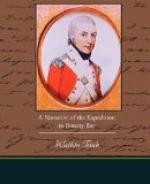Hic jacet L. RECEVEUR, E.F.F. minnibus Galliae, Sacerdos, Physicus, in circumnavigatione mundi, Duce De La Perrouse. Obiit die 17 Februarii, anno 1788.
This mark of respectful attention was more particularly due, from M. De Perrouse having, when at Kamschatka, paid a similar tribute of gratitude to the memory of Captain Clarke, whose tomb was found in nearly as ruinous a state as that of the Abbe.
Like ourselves, the French found it necessary, more than once, to chastise a spirit of rapine and intrusion which prevailed among the Indians around the Bay. The menace of pointing a musquet to them was frequently used; and in one or two instances it was fired off, though without being attended with fatal consequences. Indeed the French commandant, both from a regard to the orders of his Court as well as to our quiet and security, shewed a moderation and forbearance on this head highly becoming.
On the 20th of March, the ‘Supply’ arrived from Norfolk Island, after having safely landed Lieutenant King and his little garrison. The pine-trees growing there are described to be of a growth and height superior, perhaps, to any in the world. But the difficulty of bringing them away will not be easily surmounted, from the badness and danger of the landing place. After the most exact search not a single plant of the New Zealand flax could be found, though we had been taught to believe it abounded there.
Lieutenant Ball, in returning to Port Jackson, touched at a small island in latitude 31 deg 36 min south, longitude 159 deg 4 min east of Greenwich, which he had been fortunate enough to discover on his passage to Norfolk, and to which he gave the name of Lord Howe’s Island. It is entirely without inhabitants, or any traces of any having ever been there. But it happily abounds in what will be infinitely more important to the settlers on New South Wales: green turtle of the finest kind frequent it in the summer season. Of this Mr. Ball gave us some very handsome and acceptable specimens on his return. Besides turtle, the island is well stocked with birds, many of them so tame as to be knocked down by the seamen with sticks. At the distance of four leagues from Lord Howe Island, and in latitude 31 deg 30 min south, longitude 159 deg 8 min east, stands a remarkable rock, of considerable height, to which Mr. Ball gave the name of Ball’s Pyramid, from the shape it bears.
While the ‘Supply’ was absent, Governor Phillip made an excursion to Broken Bay, a few leagues to the northward of Port Jackson, in order to explore it. As a harbour it almost equals the latter, but the adjacent country was found so rocky and bare, as to preclude all possibility of turning it to account. Some rivulets of fresh water fall into the head of the Bay, forming a very picturesque scene. The Indians who live on its banks are numerous, and behaved attentively in a variety of instances while our people remained among them.




